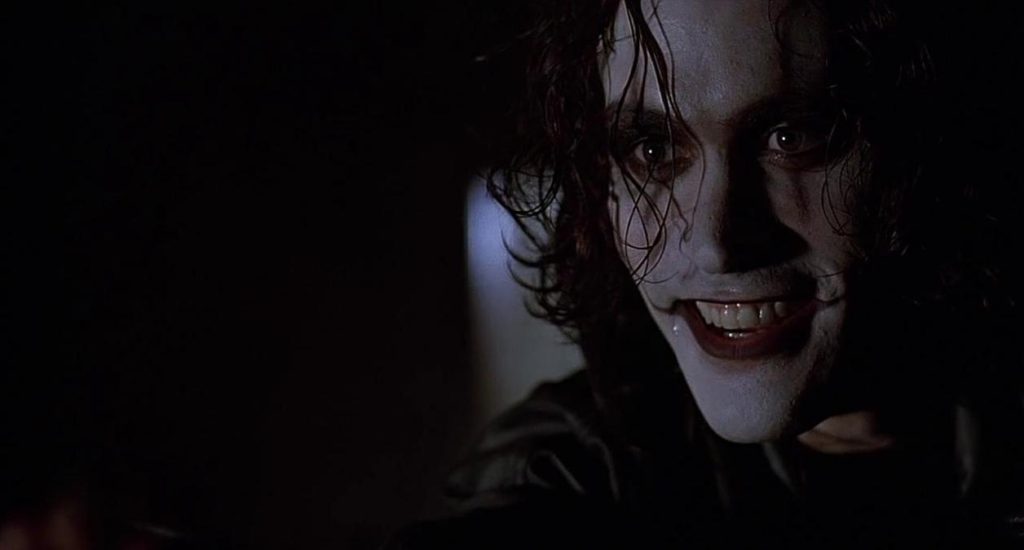It’s hard to remember a time before superhero movies were consistently juggernauts at the box office. The nineties saw the genre’s highest and lowest moments. The Batman franchise was fizzling out after Batman & Robin. But Marvel Studios soon arrived on the scene with the surprise success that was Blade. Before either of those releases changed the course of the genre, The Crow, much like its comic book counterpart, became a sleeper hit in 1994.
James O’Barr’s underground hit comic served as an example of the postmodernist narratives that had been making its way into the medium at the time. O’Barr’s purpose of writing was different from the deconstructions of the superhero philosophy of Frank Miller or Alan Moore. In that his superhero was one whose origins were rooted in pain largely connecting to O’Barr’s personal demons and tragedies. In a macabre way, the film adaptation is tied into the same sense of artistry overcoming, or succumbing to, tragedy.
A lot was riding on The Crow’s production being a success. It was the first studio production for director Alex Proyas. And was meant to be a vehicle for Brandon Lee, son of the legendary actor, writer and martial artist Bruce Lee. Lee was tragically killed on the set of The Crow late into production, shot by a prop gun that had been mishandled and fired at him.
Related: Mandy (2018) Review
Brandon Lee’s tragic death changed the course of post-production. Requiring rewrites, careful placement of stunt double Chad Stahelski, and the pioneering of a new form of visual effects to finish the film. The film has always existed with Lee’s spirit hanging over it, and has affected audiences’ reception of it since its release. Critics were not shy when acknowledging the film’s melancholic texture. But most argued that the gloomy exterior worked in its favor.
In the film, Detroit is the victim of an annual crime wave on Devil’s Night. Street gangs light fires all across the city, led by the cold and calculating Top Dollar. A year after he and his fiancé are killed by Top Dollar’s men, Eric Draven is brought back from the grave by a mystical crow to seek justice for his own murder. Draven returns to the scene of the crime and breaks down before creating the persona of The Crow and beginning his pursuit.
What makes the film special, beyond Lee’s wildly charismatic and heartbroken performance, is its sense of visual style. The Detroit cityscape as depicted here has often compared to that of Blade Runner. And I’ll stand by the comparison with regards to how atmospheric and layered the city feels.
Related: Becky (2020) Review
The Crow is born in a Gothic loft, overlooking the muddy alleyways of the city. The scuffles take place in these alleyways, pawn shops, or skyscrapers, all lit by the hail of gunfire or the orange glow of the Devil’s Night fires. The various choices in production design give a real city a grim makeover, much like the character of Draven himself.
The iconic performance from Brandon Lee is nothing if not lightning in a bottle. Changes made in post-production do not allow us to see much of Draven before his rebirth. But what remains offers many clever and heartbreaking hints.
We are never allowed to see Eric and Shelly at their happiest, except in fleeting moments of montage as Draven begins to remember his past and prepare for his present. These mere glimpses show us the happy couple that is no more. The broken bond between these two souls leaving behind a shattered and gloomy loft where The Crow prepares to do battle.
That doesn’t mean that Lee’s dialogue is all doom and gloom, as he still has a little girl named Sarah to look out for. There is a surprising amount of time dedicated to Sarah, her strained relationship with her mother, and how Draven’s return brings the two of them together.
Related: Oldeuboi / Oldboy (2004) Review
On top of that, Lee brings a charisma to the action scenes that is unmatched. Unlike the out of place quips that plagues the film of the Marvel Cinematic Universe to varying degree, Draven is an intimidating and slithery fighter. Using his words just as much as his hits to subdue his opponents.
The Crow tackles a lot of grim topics, but balances that with a cathartic revenge story that is spellbinding. The way the film is able to have Draven face what he left behind, both what he wishes to preserve and desires to raze, is a careful tightrope walk that is bolstered by the work of the supporting cast. Each profoundly affected by Draven’s death and rebirth in various ways. From Top Dollar’s desire to finish what he started to Sarah’s need for closure, death and the fickle nature of it in the film’s world haunt the city of Detroit through Draven and his mystical ally.
Lee’s tragic passing has always been a part of the film. But its legacy only becomes stronger as time goes by. It was a great loss for the Lee family, and one can only imagine what Lee’s career would have been in the decades since The Crow’s release. As it stands, The Crow is a hefty contribution to American cinema. With superhero films and even independent gems like Mandy taking cues from it all these years later.
The Crow is available to stream on YouTube.

